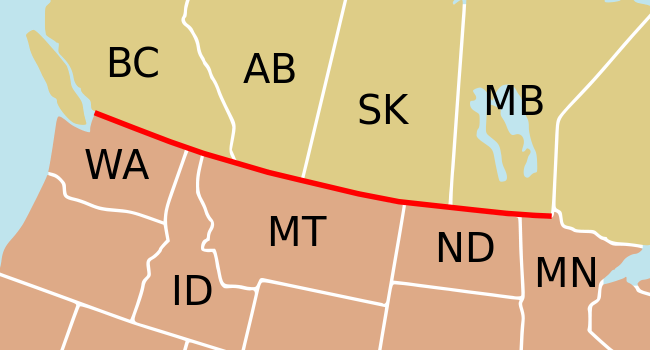
(Photo and caption: Bazonka | Wikipedia)
OTTAWA—Canada and the United States plan to clear up confusion over mistaken identities on no-fly lists and move ahead with long-promised measures to keep closer track of when citizens cross the border.
The two countries also announced Thursday they will proceed with customs pre-clearance initiatives aimed at making border processing easier for low-risk travellers.
The pre-clearance arrangements, outlined in broad terms last year, would increase the American customs presence on Canadian soil and are expected to see Canada establish similar operations in the United States.
Currently, passengers flying to American cities through eight major Canadian airports can be cleared there by U.S. Customs and Border Protection officers.
Pre-clearance will be expanded to Billy Bishop Toronto City Airport and Quebec City’s Jean Lesage International Airport, as well as for rail service in Montreal and Vancouver.
U.S. President Barack Obama and Prime Minister Justin Trudeau discussed the various border projects during a news conference at the White House.
Within 60 days, the countries plan to set up a Canada-U.S. Redress Working Group to help resolve errors of identity on no-fly lists.
Many Canadian travellers—including several youngsters—have experienced airport delays when the names of people on security lists that are similar to their own turned up during check-in procedures.
In a statement, Canada said the new processes would help expedite processing of complaints and streamline security-list removal procedures.
The two countries will also implement long-planned systems to track border entry and exit information from travellers.
The measures—almost two years behind schedule—are intended to help stem the flow of foreign fighters to conflicts in the Middle East.
For the moment, the border tracking system—promised in 2011 as part of the perimeter security pact—involves exchanging entry information collected from people at the land border, so that data on entry to one country serves as a record of exit from the other.
The first two phases of the program have been limited to foreign nationals and permanent residents of Canada and the United States, but not citizens of either country.
The initiative was to be expanded by June 30, 2014, to include information-sharing on all travellers crossing the land border.
In addition, Canada had planned to begin collecting information on people leaving by plane—something the United States already does—by requiring airlines to submit passenger manifest data for outbound international flights.
During the news conference, Obama said the countries would “uphold the privacy and civil liberties of our respective citizens” as they collaborate more closely.